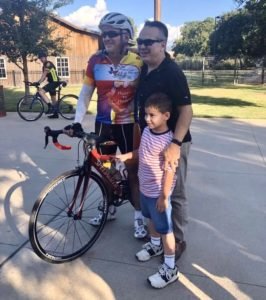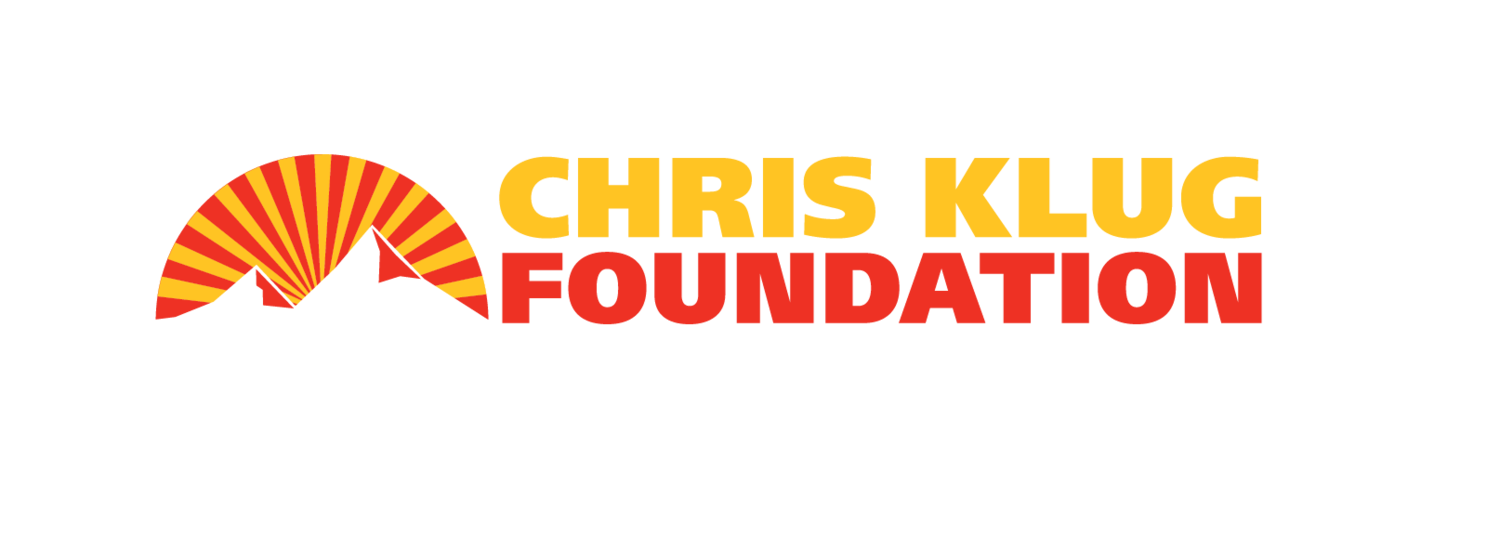More Than Blood-Related: Brother Donates Kidney to Younger Brother
Eusebio "E.J." Tamez is a living kidney donor to his brother, Luis. CKF Program Manager, CC Cunningham, recently set up a virtual chat with E.J. to interview him and learn more about his living organ donation journey alongside his younger brother. Transcribed and edited for written publication by CC Cunningham.I was born in Monterey, Mexico. I learned English as a second language when I was a sophomore in high school. That was a big challenge, to say the least, but it was well worth it: I ended up starting a whole new life in the United States, graduated college from St. Mary's University in San Antonio, Texas, and began my career. That brought me to many different places: I've lived in Georgia, South Carolina...but, after a while, I settled in south Texas and I've lived here for 21 years now.I work in the aerospace industry, managing a facility that manufactures turbine engines for airplanes. Being bilingual has a lot of advantages—to be able to speak both English and Spanish—and that's what my boss was looking for: somebody who possesses bilingual skills and a manufacturing background.I have three children: an 18-year-old, whose currently studying at the University of Texas in Austin; a 16-year-old, whose a sophomore in high school; and a 13-year-old, whose now in eighth grade.I donated my kidney to my younger brother, Luis, on March 1st, 2017. We're four boys in my family and I'm the oldest. Luis is the third brother.One day, Luis noticed he was starting to feel weak and, by the time he went to see a doctor, it was actually pretty drastic. He had a disease that made his blood pressure too high, which developed into kidney disease.He tried to take care of it by changing his diet and taking medication at first, but after four months, his doctor told him, "You need to go on dialysis. There's no other way around it." That's really when it went downhill: Luis lost his job and had to go on Medicaid to help deal with the extensive financial costs. It was a really rough part of his life.It was during this time that I went to visit him at his house on the other side of south Texas. It wasn't until I watched him struggle to pick up his own son (who was three years old at the time) that I knew I had to do something to help him. It was incredibly hard seeing my brother have such a difficult time picking up his baby boy. That triggered something in me. At that point, I didn't know much about the potential options that were available for Luis, in terms of kidney transplant. We both thought the only solution was waiting on the transplant waitlist for a match from a deceased donor.About two weeks later, I went with Luis to go to the Methodist Transplant Clinic in San Antonio to meet with his transplant coordinator and determine his spot on the waitlist. While I was waiting for him in the clinic's waiting room, a nurse—I really think of her as an angel—saw me sitting there and asked me if I'd ever considered donating one of my kidneys to my brother. I was confused and asked her more about it. She explained that, just by filling out some initial paperwork (which I could do right then and there in the waiting room), I could take the first steps to potentially donating my kidney to Luis. I immediately filled out the paperwork, which took me about 20 minutes overall, without a second thought. After I finished, this "angelic" nurse said, "You know, you don't even have to tell your brother that you're doing this, just in case you don't qualify as a match," so I didn't.Within a couple weeks, I received a phone call from the transplant center and found out that I was cleared for the next step, which was the actual medical testing and blood work to determine if I was a match. I was also introduced to my transplant coordinator. That's when I really started to get more serious about the whole thing. I kept thinking, "Would I be okay with just one kidney? What if one of my kids or my wife ever needs one?" I began to do a lot more research. I ended up reaching out to an altruistic kidney donor from Minnesota, named Michael. After getting in touch with him, he said to me, "Hey, if you or your family ever want to talk to me or my family about the whole process, let me know and we can connect at anytime." It was great. Having a "coach" like that made it a lot easier. There were some questions that were better answered by someone who had actually gone through the entire experience. That really helped me a lot. At one point, I remember thinking, "If Michael donated one of his kidneys to a total stranger and I'm debating whether to donate to my own brother...something's not right here." Why should I have any doubts about donating to my brother? It was then that I decided, if God truly wants me to donate to Luis, I would be a match (I realize now that you never really have perfect matches with living donation—you learn more about that throughout the process).After going through all the medical testing, my transplant coordinator calls me and says, "Okay, everything's good. You're a match. When do you want to schedule the surgery?" I was shocked. I couldn't believe it. At that point, I hadn't even told Luis or my wife and kids what I was thinking of doing yet—I didn't want to give them any false hope or cause for concern if it turned out that I wasn't a match. That same night after receiving the call, I spoke to my wife and children. They gave me their full support. No doubts at all. That was really beautiful—to have their encouragement. It gave me the confidence I needed to go through with the donation. The transplant coordinator assured me that I could back out of the surgery at any time and that gave me a sense of relief, like there wasn't as much pressure on me as the donor. I knew that wasn't ever going to happen, but it was nice to know.Of course, my wife had a lot of questions. She was just as I was at the beginning of the whole process: barely knowing a thing about living organ donation. Her biggest question was the same as mine: "What if one of our children ends up needing a kidney in the future?" I didn't know about paired kidney exchanges or the National Kidney Registry at the time, but that question didn't stop us from going through with the donation regardless. None of our children nor my wife nor I had any projected need for a kidney transplant. It was just my wife and I, as parents, worrying about our children's safety and health if, God forbid, anything should happen in the future. My wife ended up saying to me, "The one who needs a kidney right now is your brother. We have to take care of the person who needs it the most."The next step was telling Luis. I knew we'd be getting together for Super Bowl Sunday, so I decided to tell him in-person then. I made a card that told him I would be his donor and drew a picture of a little kidney inside. It ended up working out perfectly because his family was there, along with my family, to watch the game. Giving that card to Luis was amazing: he and his wife both started crying immediately and my wife and I, of course, cried along with them. The first thing he said to me was, "Are you sure you want to do this?" That's the kind of person Luis is: the last thing he would ever do is put someone at risk. He always puts others before himself. That's when I told him that I had already set a date for the surgery, less than a month from then, on March 1st. I just needed him to say yes. He agreed right then and there.During the three weeks leading up to the surgery, all I did was organize: I organized with my employer how long I was going to be away from work; I organized how I was going to travel to and from the transplant center (it was a three-hour drive from where I live); I coordinated with Luis where he was going to stay and recover...things of that nature. Leading up to the day of the surgery was a very spiritual time for me and my family. Having your whole family praying for you and giving you that kind of support—I felt like I was on cloud nine. I had never felt like that before in my life. I wish I could live like that forever.One of my best friends is a director for Spanish TV commercials and he actually offered to film the day-of process at the transplant center. It's an eight-minute-long video and it's very professional and well-made. My entire family was there on the morning of the surgery: my wife, my children, Luis' wife and kids, our parents, my other two brothers and their families...the whole waiting room was full of our family members. It was truly something special to witness. On top of that, with my friend and his film crew recording the whole thing, people thought we were celebrities. (Laughs)The nurses and the doctors at Methodist Transplant Clinic made us feel so comfortable. Luis kept asking me, "Are you sure? Are you sure?" Even after changing into the hospital gowns for surgery, he was still trying to give me a way out, just in case I wasn't 100% sure or was having any doubts. I just kept telling him, "Listen, I'm positive this. 100%. I have no doubt about it. It's exactly what I want to do."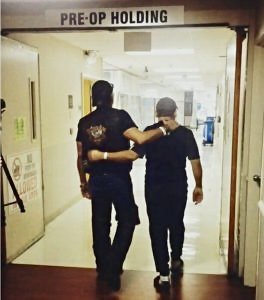 I was in surgery for about three hours and Luis was in a little longer. Just by coincidence, the surgery happened to fall on Ash Wednesday, which, for us Catholics, is a big holiday. When I woke up after coming out of surgery, the first person I saw—before any of my family or any doctors or nurses—was a priest. He came up to my bed and asked, "Would you like ashes on your forehead?" which is traditionally how Catholics observe the holiday: by having a priest mark your forehead with ashes in the shape of a cross. I replied yes and he put the ashes on my forehead in prayer. I couldn't believe it; it was the most beautiful moment for me, as a spiritual person of the Catholic faith.When the doctor came in, he assured me that Luis was doing great and his new kidney was working perfectly. I was taken to see my family shortly after. My wife immediately began asking me how I was feeling. I must admit, there was definitely some pain—the living donation process isn't pain-free, of course—but I was feeling fine overall.Luis joined us about five hours after his transplant surgery. Even though he was in a wheelchair at the time, we just kept hugging one another and crying together. It was then that Luis' son—my nephew and godson—approached me and gave me a little silver pendant in the shape of a kidney. He said to me, "Uncle EJ, this is yours because you saved my dad's life. Thank you." I was completely overcome with emotion. I cry every time I think about it. That feeling...you just can't put it into words. It's something that I'll never forget. That's really when I knew that I had done the right thing. Now, I always say, "If I had three kidneys, I'd give two." That's how amazing it felt to see the impact my donation had.My doctor told me I could go home that same day if I wanted, so I did. Don't get me wrong, the three-hour drive back to my house from the hospital—every pothole we hit, every bump in the road was painful. I only ended up missing seven calendar days of work. I actually ran a 5K just one week after surgery.It took Luis longer to recover. He was discharged from the hospital after six days and took it easy those first three to four weeks. I think the biggest change for him was just learning how important it is to take the anti-rejection medication and how to make it part of his daily routine.Before the surgery, Luis wasn't very active, athletically speaking. He wasn't involved in any sports or anything. But after his transplant, it's like his whole life changed. He would say to me, "I think something in your kidney is pushing me to be more active," because I've always been an athletic person. He ended up buying a road bike, for cycling, and started training and competing in races. Last year, Luis and I both competed in a race where you ride 100 miles in one day on a road bike. Our employers sponsored us and we wore jerseys to represent our companies. It felt so good to both cross the finish line that day. It was an amazing experience to be able to do together.
I was in surgery for about three hours and Luis was in a little longer. Just by coincidence, the surgery happened to fall on Ash Wednesday, which, for us Catholics, is a big holiday. When I woke up after coming out of surgery, the first person I saw—before any of my family or any doctors or nurses—was a priest. He came up to my bed and asked, "Would you like ashes on your forehead?" which is traditionally how Catholics observe the holiday: by having a priest mark your forehead with ashes in the shape of a cross. I replied yes and he put the ashes on my forehead in prayer. I couldn't believe it; it was the most beautiful moment for me, as a spiritual person of the Catholic faith.When the doctor came in, he assured me that Luis was doing great and his new kidney was working perfectly. I was taken to see my family shortly after. My wife immediately began asking me how I was feeling. I must admit, there was definitely some pain—the living donation process isn't pain-free, of course—but I was feeling fine overall.Luis joined us about five hours after his transplant surgery. Even though he was in a wheelchair at the time, we just kept hugging one another and crying together. It was then that Luis' son—my nephew and godson—approached me and gave me a little silver pendant in the shape of a kidney. He said to me, "Uncle EJ, this is yours because you saved my dad's life. Thank you." I was completely overcome with emotion. I cry every time I think about it. That feeling...you just can't put it into words. It's something that I'll never forget. That's really when I knew that I had done the right thing. Now, I always say, "If I had three kidneys, I'd give two." That's how amazing it felt to see the impact my donation had.My doctor told me I could go home that same day if I wanted, so I did. Don't get me wrong, the three-hour drive back to my house from the hospital—every pothole we hit, every bump in the road was painful. I only ended up missing seven calendar days of work. I actually ran a 5K just one week after surgery.It took Luis longer to recover. He was discharged from the hospital after six days and took it easy those first three to four weeks. I think the biggest change for him was just learning how important it is to take the anti-rejection medication and how to make it part of his daily routine.Before the surgery, Luis wasn't very active, athletically speaking. He wasn't involved in any sports or anything. But after his transplant, it's like his whole life changed. He would say to me, "I think something in your kidney is pushing me to be more active," because I've always been an athletic person. He ended up buying a road bike, for cycling, and started training and competing in races. Last year, Luis and I both competed in a race where you ride 100 miles in one day on a road bike. Our employers sponsored us and we wore jerseys to represent our companies. It felt so good to both cross the finish line that day. It was an amazing experience to be able to do together.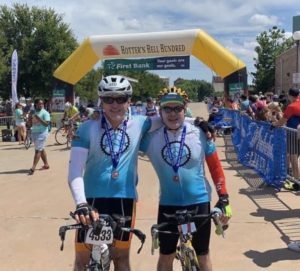 That was actually just one of many athletic events Luis and I have done together since the surgery. In 2018, the two of us went to the Transplant Games of America in Salt Lake City, Utah, where we competed with the Texas team in a few different sports.
That was actually just one of many athletic events Luis and I have done together since the surgery. In 2018, the two of us went to the Transplant Games of America in Salt Lake City, Utah, where we competed with the Texas team in a few different sports. 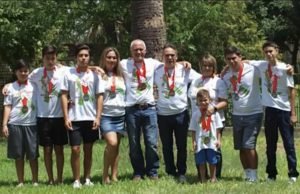 It was awesome to meet—not only transplant recipients, like Luis—but also so many living donors, like myself. The best part of the whole event was hearing other people's stories: what they had gone through, their experiences, what organ(s) they had received or donated, how it's changed their lives. On the first day of the 2018 Games, we went to the grand opening in this gigantic stadium, like the real Olympics. Luis and I walked out with the Texas team and all of the other teams from all over the country. It was so surreal: you walk out into the center of the stadium and everyone's clapping and cheering for you. It was an extremely emotional moment for all of us, especially my wife.There's this one really special athletic event here in Texas called the Lone Star Circle of Life Bike Tour. It's a week-long, 600-mile cycling tour across the entire state of Texas,
It was awesome to meet—not only transplant recipients, like Luis—but also so many living donors, like myself. The best part of the whole event was hearing other people's stories: what they had gone through, their experiences, what organ(s) they had received or donated, how it's changed their lives. On the first day of the 2018 Games, we went to the grand opening in this gigantic stadium, like the real Olympics. Luis and I walked out with the Texas team and all of the other teams from all over the country. It was so surreal: you walk out into the center of the stadium and everyone's clapping and cheering for you. It was an extremely emotional moment for all of us, especially my wife.There's this one really special athletic event here in Texas called the Lone Star Circle of Life Bike Tour. It's a week-long, 600-mile cycling tour across the entire state of Texas, 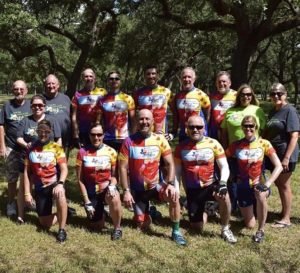 beginning in Tyler (near Dallas) and ending all the way down in Corpus Christi on the southern coast. Only 12 non-professional cyclists, whose lives have been touched by organ donation in some way, are specially selected for the tour. The event takes place once every two years...all to raise awareness for organ donation and the need for lifesaving donations. All I wanted was to get picked to ride in the event—to be a part of it—because you're not just riding: you're also speaking out about organ donation. Participants ride about 80-120 miles each day of the tour and stop in different towns to spend the night. Every town you stop in honors a Texan in need of a transplant, with the residents of the towns selecting these honorees from within their own communities. I was selected to participate in the 2019 tour and it was truly a remarkable experience. In each town we stopped in, we met the honorees and learned about their stories. We also had the chance to speak to people within these different communities. Luis even rode one leg of the trip with me: a 90-mile ride from Waco to College Station.Besides participating in those events to promote organ donation, I've also gotten involved with the Texas Organ Sharing Alliance (TOSA), an organ procurement organization (OPO) in San Antonio. I've gone to a few of their events and I wish I could participate more, but I live about 160 miles away from where they're located, so it's hard.To someone whose considering becoming a living organ donor, I say: do your homework, do the research, but most importantly, talk to a living donor whose gone through the process already. It'll give you more confidence in your decision and answer a lot of your questions. You'll get the real answers, the truth. We're not going to tell you it was 100% easy and painless—because it wasn't. We will tell you the truth: the real answers you're looking for. After that, that's when you make your decision.I will say that living donation changed my life in ways I could never have imagined. Not a day goes by that I don't I wake up and thank God for granting me the opportunity to help my brother and save his life. And that's the thing with living donation: at its core, it's about helping someone in need.
beginning in Tyler (near Dallas) and ending all the way down in Corpus Christi on the southern coast. Only 12 non-professional cyclists, whose lives have been touched by organ donation in some way, are specially selected for the tour. The event takes place once every two years...all to raise awareness for organ donation and the need for lifesaving donations. All I wanted was to get picked to ride in the event—to be a part of it—because you're not just riding: you're also speaking out about organ donation. Participants ride about 80-120 miles each day of the tour and stop in different towns to spend the night. Every town you stop in honors a Texan in need of a transplant, with the residents of the towns selecting these honorees from within their own communities. I was selected to participate in the 2019 tour and it was truly a remarkable experience. In each town we stopped in, we met the honorees and learned about their stories. We also had the chance to speak to people within these different communities. Luis even rode one leg of the trip with me: a 90-mile ride from Waco to College Station.Besides participating in those events to promote organ donation, I've also gotten involved with the Texas Organ Sharing Alliance (TOSA), an organ procurement organization (OPO) in San Antonio. I've gone to a few of their events and I wish I could participate more, but I live about 160 miles away from where they're located, so it's hard.To someone whose considering becoming a living organ donor, I say: do your homework, do the research, but most importantly, talk to a living donor whose gone through the process already. It'll give you more confidence in your decision and answer a lot of your questions. You'll get the real answers, the truth. We're not going to tell you it was 100% easy and painless—because it wasn't. We will tell you the truth: the real answers you're looking for. After that, that's when you make your decision.I will say that living donation changed my life in ways I could never have imagined. Not a day goes by that I don't I wake up and thank God for granting me the opportunity to help my brother and save his life. And that's the thing with living donation: at its core, it's about helping someone in need.